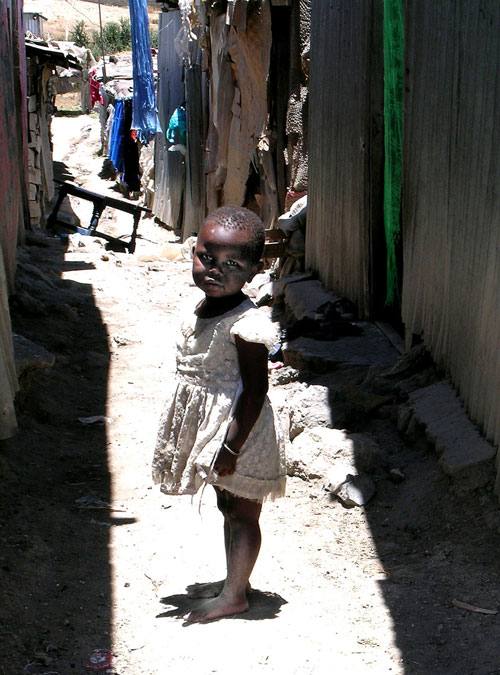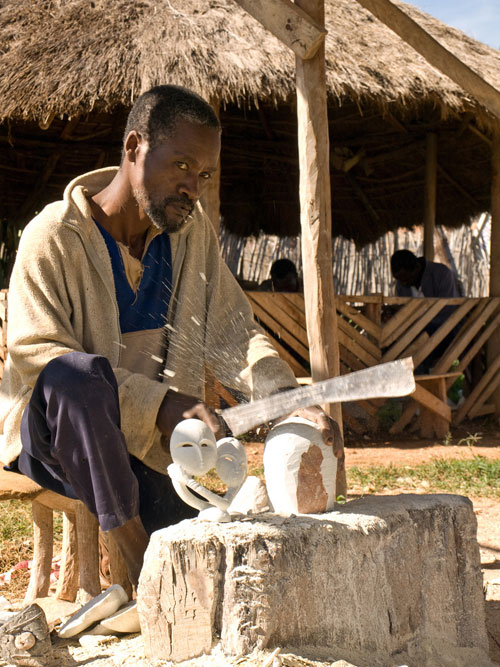A small boy outfitted in an oversized, threadbare t-shirt grabbed my sleeve. “Nipe, Mama,” he begged. Give me.
Vagabondish is reader-supported. When you buy through links on our site, we may earn a small affiliate commission. Read our disclosure.
Street orphans abound in Kenya. They crowd nearly every corner and vacant space in Kenya’s largest cities. Nobody knows for sure how many homeless kids roam the country, but estimates range from 20,000 to 60,000 street children in Nairobi alone, and with the ongoing civil conflict, there are sure to be even more.
Westerners, for the most part, are blind to the realities of life in Africa. When it comes to Kenya, we think of elephants wandering among acacia trees. We picture chocolate-skinned Maasai jumping in their shukas, beads layered across their bodies. For the most part, we imagine an exotic culture where people live with the earth, speak in beautiful tongues, and embody a carefree, simple existence.
When I squeezed into my first matatu and began looking for the seatbelt that didn’t exist, I noticed a hole in the floor below my seat that went straight to the littered ground below. When I began volunteering with a local non-governmental organization that helped educate teenagers about AIDS, I didn’t understand why one of the girls wore an Easter Sunday dress every day ”¦ until I realized it was the only clothing item she owned. When that child grabbed my sleeve with one dirty hand while gripping a bottle of glue with his other, I had to redefine what Western society told me Kenya was.

Child in the Jesus Slum, Nairobi © angela7dreams
Kenya shocked me. Every unknown made me suspicious. The street kids alone almost sent me packing. In towns, I walked quickly, gripping the canvas straps of my backpack tightly, rudely brushing off any kids who might approach me. “Potea!” I yelled at them. Get lost! They laughed and pointed at me, clustering into gangs that would follow me around town, waiting outside shops until I had returned with my purchases. One young boy grabbed my chest as I sat in a waiting vehicle. A teenaged girl, clearly high on inhalants, groped me as I walked away from a group of taunting children. I began dreading any travel outside of my temporary dwelling.
Petty crime, like street kids, is also rampant in Kenya, but this shouldn’t have surprised me. In any country where the average adult makes slightly more than a dollar a day and the unemployment rate hovers around 40 percent, what can any Westerner expect? Even my grubby, second-hand clothing stood out in a crowd.
One hot afternoon, after hours of travel from Voi to Nairobi on a crowded bus, my husband and I hopped on a matatu for a ride to Thika. We squeezed between the overweight mamas holding plastic bags filled with produce and past the children who reached out to stroke our hair-covered white skin. In the last row of seats, a single twenty-something man sat pressed against the window. As we maneuvered into the row, he slid to the center of the seat, forcing my husband to sit on one side of him while I sat on the other.
The ride was hot, and I was stifling in my sweatshirt, holding a stuffed duffel bag on my lap. All I wanted to do was to reach our final destination””a tiny rural village tucked a couple hours outside of Nairobi in Kikuyu country. As the images outside the window began to blur into a single line of color and action, I felt a strange jostle in my side. I shifted my weight and touched my rib, shocked to find the man’s fingers unzipping my “hidden” money pouch beneath my sweatshirt. I pushed him away, and he got up and moved to the front of the vehicle. I didn’t know what to do. In Kenya, people are subject to public beatings and death for being labeled a thief, and I certainly didn’t want to be responsible for anything along those lines. I signaled to my husband to check for his wallet, which was fully intact. The man got off the matatu, and I sat shaking, cursing Kenya, wanting to cry.
Although the matatus scared me with their unbeltable seat belts, questionable drivers, and clearly unsafe features, I felt safer confined in them than open and vulnerable outside. Street hawkers crowded around the vehicles pushing everything from pencils to underwear. They intimidated me, but touts (the matatu conductors who collected passengers and fare) regulated their pushiness to a certain extent so as not to lose business.
One afternoon after a day of grocery shopping and indulging in a meal out in Thika, a street hawker climbed aboard our vehicle and firmly planted himself in the seat next to me. His grin was missing two front teeth, his eyes glazed over and watered, and his body stunk of potent amounts of alcohol. He held a gaudy door decoration in my face, insisting that I wanted to buy it. The other waiting passengers watched us, giggling quietly at whatever this man was saying in a language I didn’t fully comprehend. My cheeks burned in humiliation and frustration. I didn’t understand why no one in the van would help me stand up to this guy. The street hawker poked at me and dangled the item in front of my face like bait. No, I insisted, I was not interested. The onlookers laughed, my husband tried helplessly to get the man to leave me alone, the street hawker breathed heavily in my face. Finally, in desperation, I signaled to the tout for help and the man was swiftly booted from the vehicle.

Soapstone Cutter, Kenya © wwarby
That’s when it dawned on me. As Westerners we stood out and were targeted for our skin color alone, but we didn’t have to fight our battles so passively. The culture in Kenya is generally one in which people evade issues and do not say rude or disrespectful things to one another. We tried desperately to act culturally like Kenyans but were treated culturally like the Westerners we are.
With the drunken street hawker gone, the doors closed tight, and the matatu bouncing along the potholed road, I decided to take charge of my time in Kenya by accepting the status I carried on my shoulders.
Because we lived in one area for two or three months before moving on to the next, we got to know our touts. Eventually they didn’t grab our arms or snap at us for attention. They greeted us, smiled at us, and stepped aside while we got into the van.
The street hawkers, too, began to see us as glorified locals. They still pushed plastic bins and candy through the windows, convinced we wanted to buy them, but when I put the whole picture into perspective””these guys are just trying to make a living””the street hawkers just became a commonplace, if not comical, part of Kenya. “Sure, I’d love to buy some squeaky children’s shoes,” my husband would joke with them, and they’d laugh and laugh, trying to sell him even more ridiculous items. They provided a service, and we ended up buying what we needed from them. I even began to seek out the street hawker who sold the bags of tiny, sweet plums for 10 shillings each.
Even the street kids eventually turned into a normal part of my life. At most, they were a nuisance. When younger kids approached us asking for money, we began turning their questions onto them. “Give me money,” they’d beg, yanking on our sleeves.
“You give me money,” I’d challenge, pulling gently on their baggy shirts. High or not, the kids would hoot with laughter, greatly amused by this ongoing game with a foreign couple.
“You give me money.”
“No, you give me money!”
This would last until we climbed aboard our matatu or until they became bored and wandered off.
When the perpetual warm smell of sweat didn’t bother me anymore, and the dirt caked to my ankles became a second layer of skin, and the tinny music blaring from stereo speakers turned into the background music of my life, the obvious annoyances that frightened me upon arrival were strangely comforting. The street hawkers and kids harass everyone””that’s a part of Kenya. There is petty crime, but anyone with their guard down is a target””that’s a part of Kenya. There is something good-natured in the plastic widgets and gadgets selling for a shilling and the sense of humor the street children still have after all the lonely nights and long years living in alleys””that’s a part of Kenya.
And there are elephants and beautiful people and wonderful languages as well””but they, too, are just a part of Kenya.


